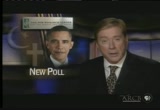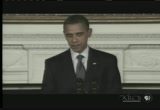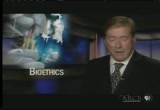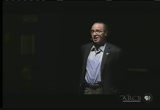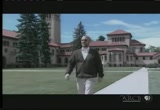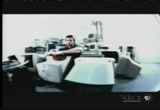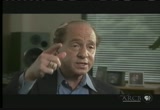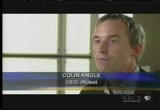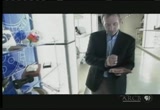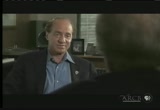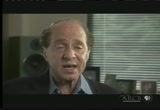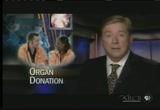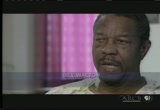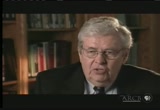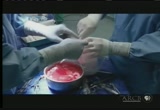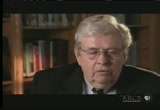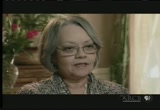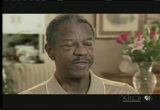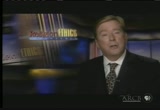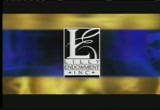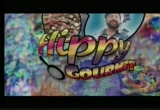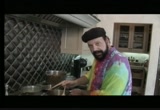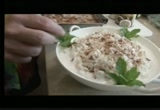tv Religion Ethics Newsweekly PBS August 22, 2010 9:00am-9:30am PST
10:00 am
coming up, the future of artificial intelligence, a famous inventor predicts we will eventually become hybrids of man and technology. >> these computers will manage us in emotional intelligence which includes our whole moral code. >> and her husband needs a kidney, but hers is not compatible. if she donates one to a stranger, her husband will get one in return from another stranger. major funding for "religion & ethics news weekly" is provided by the lily endowment, an indianapolis based private family foundation dedicated to its founders' interest in
10:01 am
religion, community development and education. additional funding by mutual of america, designing customized, individual and group retirement products, that's why we'reour retirement company.com. also by the henry luce oundion, and the corporation for public broadcasting. welcome, i'm tim o'brien, sitting in for bob abernathy. thank you for joining us, a new poll this week by the ppw research center finds that the majority of americans believe that president obama is a muslim. most of them saying they got that information from the media. meanwhile, the number of people who say they know he is christian has fallen to only 34%. the laest percentage of those polled, 43% say they didn't know the president's religion, a number which has also risen from last year, researchers say these
10:02 am
changes can be traced to attacks by opponents and on the fact that obama is not as visibly religious as his predecessors, the white house responded that the president is a christian and he prays every day. as controversy continues to surround plans for a muslim community center in lower manhattan. obama said muslims have a right to build the islamic center, although he later refused to say whether he actually supports the center being built near ground zero. at a news conference this week, several muslim advocates joined christian representatives to express their support for the project moving forward and to condemn what they called the politics surrounding the issue. meanwhil archbishop timothy
10:03 am
doll nolan has agreed to help work out a compromise. a woman has filed a complaint against the walt disney company after or take a job out of public view. when a cafe hostess at disney's grand hotel and spa refused, she was sent home without pay, disney says other cafe employees must wear uniforms and the scarf didn't f in. the equal employment opportunity commission will review the case. a cross you occasionally see on the side of the road may mean different things to different people. the utah highway patrol association, a private group planted 12-foot-high white crosses along public highways in the state. the association said the crosses were to commemorate fallen colleagues who died nearby in the line of duty. they said it cross conveys a message of death, remembrance,
10:04 am
onor, gratude, srifi. but an appeals judge also also said the crosses must go. an appeal to the supreme court seems likely. supporters of california's ban on gay marriage are applauding this week's decision to suspend gay marriages in that state. a federal judge had ruled that gay marriages could begin again, but a three judge appeals court stayed that decision until further review. the appeals court will take up the case december 6. the massive flooding continuing to devastate that country. the number of those affected by the disaster has risen to an estimated 20 million with many receiving little to no immediate assistance.
10:05 am
religion leaders have oftened prargs for the victims. the pope urgthe international community to offer concrete support to pakistan. modern technology has taken us to places we could barely imagine just a few years ago. advances in modern technology are likely --. >> repter: ray kzweimay n be a household name, but the blind know who he is. he invented the first reading machine and then reduced its size to a hand-held gadget. kurzweil will be remembered more as a man on a mission to tell the world what life will be like in the age of technology. microsoft billionaire bill gates said he is the best in the world at predicting the future, and what a world he predicts.
10:06 am
>> this is a design of a robotic red blood cell. we are going to put these technologies inside us, blood-cell-size devices that will augment our immune system, make us a lot healthier, destroy disease and dramatically push back human longevity, go inside our brains and actually enable us to remember things better, solve problems more effectively. we are going to become a hybrid of machine and our biological heritage. in my mind, we are not going to be transcending our humanity. we are going to be transcending our biology. >> reporter: kurzweil has written several books. one of the most recent, called "the singularity is near," predicts that by the year 2050 nonbiological artificial intelligence will surpass human intelligence, creating a hybrid of man and chnology. >> what i am predicting is that we will have machines. we are going to need a different word because these are not like the machines we are used to.ç these are going to be machines
10:07 am
that will seem as human, as real, as conscious, as any actual human being. >> reporter: even if nonbiological or artificial intelligence created in places like mit is not as close to "singularity" or matching human intelligence, as kurzweil believes, it's close enough that scientists and ethicists are now saying we need to take a serious look at its ramifications. professor christian brugger is a bioethicist at st. john vianney theological seminary in denver. brugger disagrees with kurzweil that humans can ever come close to perfection with technology. >> i don't think that the technology is the problem. what i have concerns about is the philosophy that stands behind it, the idea that somehow we are going to be able to overcome human limitation or we're going to overcome death. >> reporter: what troubles brugger the most is the notion that technology will one day replace god. >> if we start to think about
10:08 am
technology as a kind of savior, is it going to overcome our misguided ambitions? is it going to overcome those kinds of prejudices that cause us to hate our neighbor? to many of us who follow a religion, we'd say that god would help us to overcome those things. >> reporter: kurzweil argues that it's human nature for mankind to utilize technology to overcome human limitations. we are the species that does change ourlves. we didn't stay on the ground. we didn't stay on the planet. we didn't stay with the limits of our biology. if you want to speak in religious terms you can say that's what god intended us to do. >> reporter: kurzweil bases his predictions on what he calls the exponential growth of artificial intelligence in the fields of genetics, nanotechnology, and robotics. >> informational technology is growing exponentially, not linearly. our intuition says it grows like this -- 1, 2, 3, 4, 5 -- 30 steps later you're at 30.
10:09 am
the reality is that it grows 2, 4, 8, 16, and 30 steps later you are at billion. when i was a student at mit, i went there because it was so advanced at that time it actually had a computer, and it costs tens of millions of dollars. it took up half a building. the computer that i carry around and that we all carry around is a million times less expensive. it's a thousand times more powerful. >> reporter: john donoghue is a professor of neuroscience and engineering and director of the brown university institute for brain science. he says his work has not progressed exponentially. but in only ten years, he's been able to implant sensors in the brains of paralyzed patients enabling them to operate a computer, type, run a robotic limb simply by thinking, sending out brain signals. >> the value of the technology is first for people who are severely paralyzed. the first step is to give them any control at all. they can't do anything without help from someone else. people want and feel some sense
10:10 am
of pride in taking care of themselves so anything we can restore is a great step. >> report: neuroscience has yielded other life altering advances. for instance, there are now over 75,000 parkinson patients worldwide who've had tiny electrodes implanted in their brains. doctors say the operation significantly reduces tremors and allows patients to rely less on medications. >> by the way, nobody is picketing, protesting, oh, people putting computers in their brains -- that is somehow unnatural or defies the way things should be. >> reporter: bioethicist brugger worries that science will soon cross thline to where brain implants will not simply heal patients, but enhance their ability to think and compete. >> if we move in this direction of radical human enhancement, are we going to develop those who are and those who aren't?
10:11 am
the enhanced and the unenhanced? i mean, lord, we can't even find the money to get everyone braces who needs braces. >> when the technologies are only affordable by the rich they actually don't work very well. consider mobile phones. 15 years ago somebody took out a mobile phone in the movie. that was a signal this person is very powerful and wealthy, and they didn't work very well. now 5 billion people out of 6 billion have mobile phones, and they actually work pretty well. >> a lot of people worry about one day there will be a knock on the door, and there will be a robot, and you would say where did that come from? and i will tell you that the future is going to be much stranger. >> reporter: colin angle is the cofounder and ceo of irobot, better known as the creator of the roomba, the floor cleaning robot or the packbot robot used to disarm roadside bombs in iraq and afghanistan, and soon to be released-robots that can keep track of grandma and remind her when it's time to take her meds. >> we call it a physical avatar, and so that these robots would
10:12 am
allow a doctor to visit a patient in their own home without ever having to leave his doctor office. these robots are meant to be surrogates for people, so the personality of the doctor will be the personality of the robot. >> i think that irobots are wonderful, if they can do the vacuuming for me so i can read a good book. i'm happy with that. but irobots are not my wife, and they are not my children. they are not even an animal. >> reporter: angle doesn't believe robots will ever replace humans, but he says notwithstanding the science fiction stories of robots run amok, society needs them. >> throughout history there are many different situations where technology exists and can be used for good or evil, and i think that as robots become more capable we need to be careful about using robots to help society. >> the classic scary story is "the matrix," of course, where you plug in and you live in this other reality.
10:13 am
>> reporter: the reality where computers take over the world. >> we marveled at our own magnificence as we gave birth to ai. >> ai? you mean artificial intelligence? >> a singular consciousness that spawned an entire race of machines. we don't know who struck first, us or them. >> reporter: kurzweil himself worries about technology falling into the wrong hands. >> the same technologies that are being used to reprogram biology away from heart disease and cancer, presumably good things, could be deployed by a bioterrorist to reprogram a biological virus to be more destructive, and that's actually a specter that exists right now. >> reporter: he says he's working with the military to develop a system to detect rogue viruses, something like the virus protection found in today's computer software. but he sees the good society can gain from artificial
10:14 am
intelligence far outweighing the bad. >> that was the family religion. it was personalized. you, ray, can find he ideas that will change the world. >> reporter: kurzweil has patented over two dozen inventions, including the first music synthesizer, which he sold to stevie wonder. president clinton awarded him the national medal of technology, and few have more faith in technology than ray kurzweil. >> computers are already better than humans at logical thinking. it is our emotional intelligence, the ability to be funny, to get the joke, that is the cutting edge of human intelligence. that's the most sophisticated, complicated thing we do, and that's exactly the heart of my prediction that these computers will match us in emotional intelligence, which includes our whole moral system. >> i don't think that will ever be reached because now we are dealing in the realm of the spirit. if the entire realm of the spirit that has been spoken about in the history of poetry
10:15 am
and literature and philosophy and theology is reducible to electrical synapse, then we can reproduce it eveually in a machine, because electricity is at the basis of the machine. i deny that premise. i think that there is more to human beings than reducible to measurable stimuli, and in that regard i don't think that machines are ever going to be able to be human. >> reporter: undaunted by his critics and skeptics, kurzweil is so convinced that artificial intelligence will one day enable man to live forever he is doing everything he can to be around when it happens. >> well, here's to living forever. that's not just a salutation in r fily. >> i want to live indefinitely, and actually i think we all do. people say, oh, i don't want to live forever, 100 would be great. when they get to 100, they don't want to die tomorrow. >> reporter: kurzweil is so determined to live indefinitely.
10:16 am
he takes as many as 200 supplements each day, says this regimen made it possible to reverse both his diabetes and his age. his most recent full-blown checkup results show he has the body a mind of a 40-year-old kurzil i62 and striving for immortality. for "religion and ethics newsweekly," i'm lucky severson in boston. now a special update about organ donation. it used to be that most organ transplants came from deceased donors, but in the case of kidney transplants, medical advances have opened the door for many more transplants from living donors. experts say it is an hical good to become an organ donor. but how far should society go? promoting organ donation? kim lawton has our story. >> reporter: it's early morning at washington hospital center and time for a quick prayer before flavia walton heads into
10:17 am
surgery. >> we ask the you to guide the surgeon's hands, lord. for eight years, flavia's husband, bill, has had severe kidney disease, and flavia is donating a kidney. but her kidney isn't going to bill. they weren't compatible enough, at least when it came to kidneys. so bill had to be put on the transplant list. >> you are placed on the list, and then the wait begins, and it goes on and on and on, and your only hope is you can check the list on the internet and see if the numbers are getting any smaller. but they never do. >> reporter: then bill and flavia heard about a program known as a paired kidney exchange, where flavia could donate her kidney to somebody else, and in exchange bill would get a kidney from another donor who was a perfect match. >> bottom line here is you've got to give one to get one. >> reporter: the waltons were part of the world's largest kidney swap to date, sponsored
10:18 am
by washington hospital center and georgetown university hospital. it involved a complex chain of 28 surgeries at four different hospitals. most of the donors gave a kidney in order to benefit a friend or family member. but a couple of donors did it out of a sense of altruism, with no particular recipient in mind. in the end, 14 patients who had been particularly hard to match received kidney transplants. the donors and recipients were introduced to each other at an emotional news conference. >> i love this guy. i don't even know him, but i love him. >> you can't imagine how fortunate i feel that somebody from somewhere in the universe came and gave me a kidney. >> to see someone that you love most in the world deteriorate is a sense of helplessness and powerlessness that you just cannot comprehend unless you've been there. but to be able to do something
10:19 am
is so empowering, but it is such a blessing. >> reporter: more than 100,000 americans are currently on the waiting list for an organ transplant, the vast majority of them waiting for a kidney. over the last decade, an estimated 60,000 people died while still waiting for a transplant. given those numbers, many experts say there is a moral obligation to encourage more people to become organ donors. >> just a little nudge would do enormous amounts of good in terms of saving lives and making sick people's lives better. >> reporter: the incentive for flavia walton to become an organ donor was clearly to benefit her husband of 42 years. >> if god could give his son for me, or for us, i could certainly give a kidney to keep someone else alive. and i certainly want to keep him around as long as possible. i don't know if he wants to keep me around that much longer. >> no, i got no complaints. >> okay, okay.
10:20 am
but no, it was not a hard decision at all. >> reporter: living donors are screened psychologically to ensure they are not being unduly pressured into the surgery. it is major surgery, but because of medical advances the risks to the donors are quite low. because of these factors, professor veatch at georgetown university's kennedy institute of ethics says there are few ethical problems with kidney swaps such as the one the waltons were part of. >> if we can get a living donor we get a better kidney, a more viable kidney, and it shows up in the survival-rate statistics. >> reporter: his main ethical concern with the swaps is making sure that kidney patients without a loved one willing to donate are not pushed lower on the waiting list, particularly those with hard-to-match blood types. >> we at least want to be fair with the people on the wait list who don't have a family member available.
10:21 am
being fair might mean waiting a trivial extra amount of time, but we certainly don't want to make those people wait years extra just because of the swap arrangements. >> while the swap program has been successful, some other strategies to encourage organ donation have run into roadblocks because of the national organ transplant act, which forbids any monetary compensation for organ donation. 25 years ago, veatch testified in support of that law, but he's now urging that it be revisited. he's calling for experimentation with some token financial incentives. for example, he would support a modest discount on driver's license renewals for people who sign up to be organ donors. or, he says, there could be a question on income tax returns asking people to be donors, and even offering a tax deduction for those who say yes. >> it sort of taints the
10:22 am
altruism of organ donation. on the other hand, real human lives are at stake here, and i would be willing to compromise the altruism at the margins if u we can really save some lives. >> reporter: veatch also says the religious community should do more to promote organ donation. >> it's considered an altruistic, charitable act, and all the major religions look favorably upon that behavior. >> reporter: veatch tries to counter one theological concern he hears among some conservative christians, especially in the black church, who believe individuals will be bodily resurrected in the end times, and therefore they worry about the implications of organ donation. >> the doctrine is when you are resurrected you will be resurrected to look like you, but with all the bad stuff fixed.
10:23 am
so if you had cancer, the cancer won't be there, and if organs had been procured, or consumed by fire, you will get a new version of the body. flavia walton, who is a member of the african methodist episcopal church, says she tries to address that theological issue in her community as well. >> i think that there's some notion or some belief among many that feel that when we meet our maker, we have to meet our maker all in one piece. for me, it means i just want to meet the maker. i don't think the maker cares whether i'm all in one piece or not. i don't think that's the issue. >> reporter: the waltons say organ donation is of particular concern to african americans because more than 60% of patients who need transplants are non- white. at the same time, african americans have a disproportionately low rate of organ donation. the waltons hope their story can help change that. >> exposure is key, and the more we can expose to that population
10:24 am
that it works and we're examples of that, the more emphasis we can get out there that spread the word and let's proceed. >> reporter: after two years on dialysis, bill says he can't believe how great he feels now. he says the gift of someone else's kidney has meant everything to him. >> life, basically. you can't get any more basic than that. life with a little ginger thrown in, because it's a life that is much more comfortable than what i had. >> reporter: flavia says donating a kidney turned out to be a spiritual experience for her, definitely worth the short time she spent recovering from surgery. >> just feeling good that i've been able to do something and that hopefully i'll be able to make a difference not only in the life of the recipient of my kidney, but hopefully it'll
10:25 am
spread, and hopefully i'll be able to make a difference in helping other people make a decision to make a difference in the lives of others. >> reporter: and as politicians and ethicists wrestle over how to encourage more organ donations, the waltons hope stories like theirs will be the best incentive of all. that's our program for now, i'm tim o'brien, there's much more on our website, including more from our futurist, and more on organ donation, including more from the emotional event where gan donors an resip yenlts meet for the first time. you can follow us on our facebook paige. join us at pbs.org. as we leave you, scenes from a service held in turkey last sunday at a greek orthodox
10:26 am
monastery once closed by the turkish government. thousands of people attended the service, the first held at this site in almost 90 years. [ saking in native language ] major funding for "religion & ethics news weekly" is provided by the lily endowment, founded community development and education. additional funding by mutual of america, designing customized and individual group retirement products, that's why we're your retirement company.com. also by the henry luce fodation, and the corporation for public broadcasting.
10:27 am
>> hey, we have some arborio rice today, and i'm going to give it a little different spin. it's going to be a coconut raisin sweet risotto. i'm going to start with a little grapeseed oil, and i just need enough in there to coat the rice. add my rice to the oil. i'm going to be using some of these beautiful, organic golden raisins. so these are going to go right into my water, and this is going
10:28 am
to end up being the liquid that i actually cook the rice in. about two teaspoons of salt. so that's how you do it. you just keep adding a little bit of the juice from the raisins, then you let that absorb a little bit, and then you keep stirring it, just keep it moving. ahh, it's starting to soften up. pure example of fusion. coconut milk right into the rice, and then right on top of that i'm putting all my raisins. and these are the golden raisins that i've been using the juice from. and of course it wouldn't be coconut rice without a little fresh coconut. i'm going to brown it just lightly on the top. and definitely keep an eye on this, because all it takes to brown is about 30 seconds. after the rice has sat for a little while, about 10 minutes, transfer that to your serving bowl. and if you're like me, you can't get enough coconut milk, so i like to serve it just putting a
10:29 am
little bit of coconut milk right around the perimeter. and then of course, the final topping. [ sniffs ] ahh, the smell. i love that smell, fresh coconut. >> that coconut rice looks awesome. >> coconut, you can't go wrong with that. and the perfect garnish is a fresh sprig of mint right from the garden. to learn more about the hippy gourmet and where to purchase the hippy gourmet's quick and simple cookbook for healthy eating, visit hippygourmet.com.
352 Views
IN COLLECTIONS
KRCB (PBS) Television Archive
Television Archive  Television Archive News Search Service
Television Archive News Search Service 
Uploaded by TV Archive on

 Live Music Archive
Live Music Archive Librivox Free Audio
Librivox Free Audio Metropolitan Museum
Metropolitan Museum Cleveland Museum of Art
Cleveland Museum of Art Internet Arcade
Internet Arcade Console Living Room
Console Living Room Books to Borrow
Books to Borrow Open Library
Open Library TV News
TV News Understanding 9/11
Understanding 9/11
